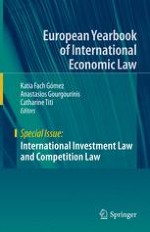This EYIEL special issue examines the interaction between international investment law and competition law. Although issues related to both international investment law and competition law arise regularly in international legal practice and are examined together, scholarly analysis largely treats them as parallel universes. As a result their actual and potential overlap has yet to be sufficiently explored. In this light, International Investment Law and Competition Law discusses a variety of topics at the intersection of investment and competition, including the interaction between competition-related provisions and investment protection standards in free trade agreements; investors’ anti-competitive behaviour and illegal investments; state aid schemes and foreign investors’ legitimate expectations; EU member States’ compliance with investment awards as (illegal) state aid under EU law; State-owned enterprises and competitive neutrality; and interactions between public procurement, investment and competition law.
